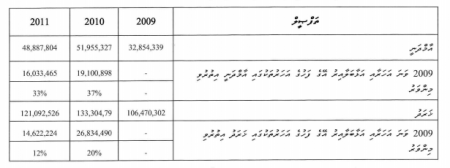A special audit of the defunct Maldives National Broadcasting Corporation (MNBC) has uncovered corruption in a deal designating Business Image Group Pvt Ltd (BIG) the former state broadcaster’s exclusive sales agent with a 15 percent commission from the main income items.
The audit report (Dhivehi) made public on Thursday (April 17) revealed that an agreement was signed with BIG on March 7, 2010 to formulate a business plan and provide marketing consultancy.
In addition to making BIG the exclusive sales agent for a five-year period, MNBC agreed to pay the company a monthly fee of MVR25,000 (US$1,621) as well as 15 percent of all income generated through BIG.
Auditors found that the contract was awarded to BIG without a transparent and competitive bidding process.
While an announcement seeking a marketing consultant was made on January 3, 2010, the audit report noted that it made no mention of either an exclusive sales agent or a sales commission.
“Therefore, the bidding process was carried out in a way to facilitate undue benefit to a particular party,” the report stated.
The report further noted that MNBC did not share any documentation from the bidding and evaluation processes with the audit office.
In the absence of any documentation with the exception of the MNBC board’s decision to make BIG the exclusive sales agent, the report stated that auditors were unable to ascertain whether a cost-benefit analysis was carried out.
 While MNBC’s income increased in 2010 and 2011, the report explained that there was no measure to evaluate BIG’s performance or assess the company’s contribution to the revenue growth.
While MNBC’s income increased in 2010 and 2011, the report explained that there was no measure to evaluate BIG’s performance or assess the company’s contribution to the revenue growth.
MNBC was formed in January 2009 as a 100 percent government-owned corporation by the administration of former President Mohamed Nasheed.
The television and radio channels operated by the company were handed over to the Maldives Broadcasting Corporation (MBC) – created by an act of parliament in June 2010 – in the wake of the controversial transfer of presidential power on February, 7, 2012, during which the state broadcaster was stormed by mutinying police and soldiers.
The audit meanwhile revealed that as of August 2012 BIG was paid a total of MVR5.78 million (US$374,837) as sales commission.
Auditors were unable to verify from the available documentation – payment vouchers and invoices submitted by the company – that the commission was provided from additional income generated as a result of BIG’s work.
Moreover, BIG sought a further MVR6.7 million (US$439,040) in October 2012. The release of the funds was however halted on instruction from the Anti-Corruption Commission (ACC) pending the completion of an investigation.
Auditors concluded that BIG was not owed a commission from income generated from public announcements, SMS, my tones, advertisements, and airtime sales.
Based on the findings, Auditor General Niyaz Ibrahim recommended that the case should be investigated by the ACC and that action should be taken against the officials responsible for drawing up the agreement in a manner detrimental to the interests of MNBC.
Meanwhile, in March this year, three pro-government Malé City councillors alleged corruption in the awarding of the ‘Clean Green Malé’ project to BIG by the opposition Maldivian Democratic Party-majority (MDP) council. The allegations by the ruling Progressive Party of Maldives councillors were denied by those of the opposition party.
Other cases
The special audit also flagged four other cases of ostensibly corrupt practices at MNBC.
In January 2011, the Finance Ministry arranged a MVR47.8 million (US$3 million) loan from the State Bank of India to settle unpaid bills and develop an uplink system.
However, the uplink system project was halted after imported equipment was not paid for, auditors found. Of the US$3 million loan provided to MNBC, only US$127,000 was spent on the project for an advance payment and bank charges.
After paying an upfront fee, management fee, and interest payments, the report noted that the rest of the loan was used to pay salaries for MNBC staff and cover other recurrent expenditure.
As 85 percent of the loan was used for recurrent expenditures, the audit concluded that the purpose for which the loan was obtained was not served.
Moreover, as a result of MNBC’s failure to repay the loan in monthly installments at the end of the grace period in February 2012, the report noted that the State Bank of India liquidated the deposit kept at the bank by the Finance Ministry.
In another case, auditors found that MNBC provided MVR1.5 million to an individual in September 2011 to exchange for US$100,000.
While the individual was not licensed to exchange foreign currency, the state broadcaster has not received either the dollars or the rufiyaa as of the report’s publication.
As MNBC asked police to investigate the matter five months after the dollars were due, the audit office concluded that the corporation’s senior officials and board members were negligent and responsible for the loss.
The auditor general recommended an ACC investigation of the case and action against responsible officials.
In a third case highlighted in the report, auditors discovered that MNBC was owed MVR10 million (US$648,508) as of March 2012 for sales as well as services rendered.
As MNBC has since been dissolved, the report noted that no efforts were underway to recover the money owed.
Lastly, auditors found that the Finance Ministry provided MVR10 million to MNBC ahead of the 17th SAARC summit held in Addu City in November 2011 after the state broadcaster informed the ministry that it lacked funds in the budget to cover the summit.
In order to arrange the funds, the report revealed that the Finance Ministry decided to take MVR15 million (US$972,762) as dividends from the state-owned Kooddoo Fisheries Maldives Ltd.
A MVR10 million cheque sent to the ministry by Kooddoo was given to MNBC without depositing the funds in the public bank account as required by the Public Finance Act, the report revealed.